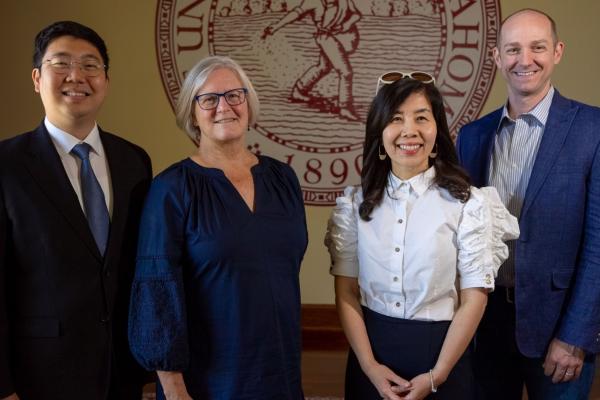
Former FPG’er Wonkyung Jang will use Educare data in new research
Original story from the University of Oklahoma-Tulsa.
Research has shown that childhood peers can influence the behavior and development of young children, but a team of researchers from University of Oklahoma have received a grant from the U.S. Department of Health and Human Services to delve further into this interesting finding.
“Current research mainly focuses on the influence of caregivers like teachers and parents, on children's learning and development. The research gives less attention to the impact of peers on young children's outcomes,” says Wonkyung Jang, PhD, principal investigator on the project and assistant professor in the department of Instructional Leadership and Academic Curriculum at OU-Tulsa. “We will use cutting edge machine learning techniques to dig into data on peer effects in early care and education settings.”
Jang (pictured above at far left with Diane Horm, Kyong-Ah Kwon, and Tim Ford), who received his PhD in early childhood education at the University of North Carolina at Chapel Hill and worked as a research assistant at the UNC Frank Porter Graham Child Development Institute, goes on to explain that most peer effect studies have explored simply whether or not peer effects exist, but their research will examine the ways in which exposure to peers has an impact on young children, infancy to five years of age, as well as how different contexts play a role in these interactions.
The research proposal, “Innovative Approaches to Studying Peer Effects in Head Start and their Implications for Policy, Research, and Practice,” will use data collected from Head Start and Early Head Start programs that are part of the Educare Network. “The sample is really diverse,” says OU-Tulsa’s Diane Horm, PhD. And that's an exciting thing about this project―not only is our sample so large, but it's current and diverse. This feature distinguishes our study from others using datasets that are older and thus not as reflective of the current composition of young children across the US.”
Once the review and analysis of the data has been completed, the Educare Network―including the Head Start and Early Head Start programs―will benefit from the findings to use in future policy and program decisions. Kyong-Ah Kwon, PhD, an associate professor and leader of the OU Happy Teacher Project Team, explains the value of these findings, saying, “This study will have very important implications for how all Head Start and Early Head Start [programs] will consider their current policy and practices to maximize children's learning and potential and then offer a more equitable learning environment for those children.”
Collaborators at the Educare Learning Network and researchers at the UNC Frank Porter Graham Child Development Institute (FPG), including senior research scientist Noreen Yazejian, will join the OU team for this project.
“We are really excited about OU’s new project and the potential it has for impacting the field,” says Noreen Yazejian, PhD, interim associate director for research at FPG, which is an Educare national evaluation partner. “The Educare National Evaluation dataset reflects the contributions of Educare children and families, staff, leaders, evaluators, and funders, and we are thrilled that a team will use the data to answer important questions about early care and education settings and in particular peer influences. That the team is led by a promising young scholar who received his training at UNC and previously worked at FPG is particularly rewarding to those of us who mentored Wonkyung.”
The collaboration of several OU units, researchers at UNC-Chapel Hill, and colleagues representing Educare ensures the research is informed by multiple perspectives. This intentional design will increase the relevance of the findings for informing practice, policy as well as future research.
Read the original story on the University of Oklahoma-Tulsa’s website.
